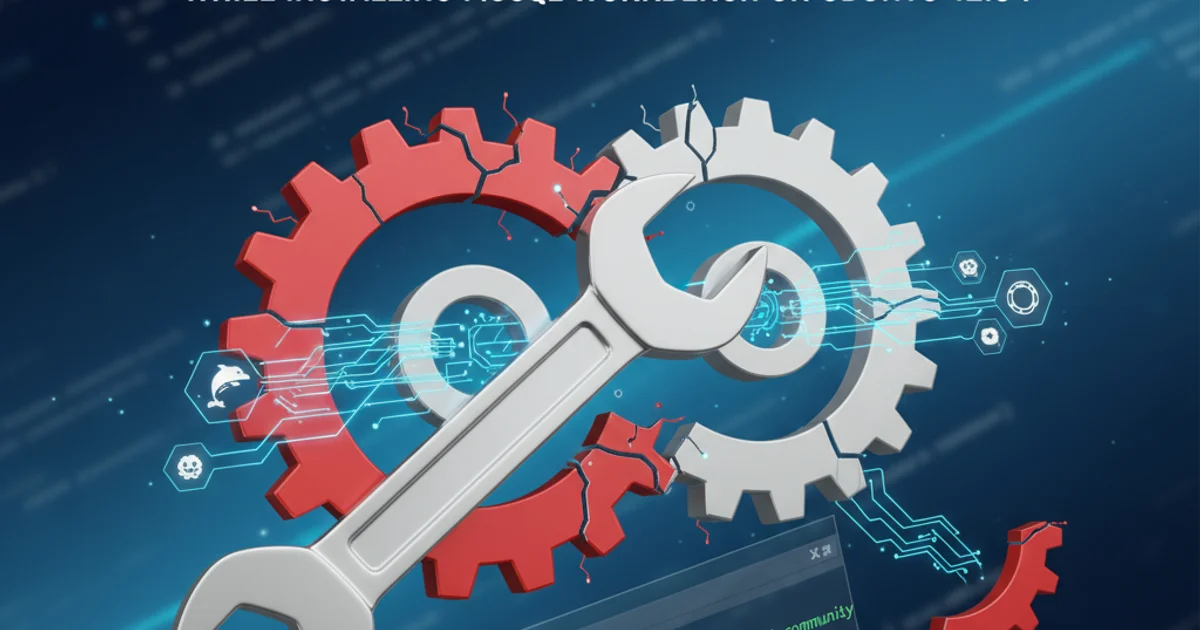Dependency error while installing mysql workbench on ubuntu 12.04
Resolving Dependency Errors for MySQL Workbench on Ubuntu 12.04

A comprehensive guide to troubleshooting and fixing common dependency issues when installing MySQL Workbench on Ubuntu 12.04, ensuring a smooth setup.
Installing MySQL Workbench on older Ubuntu distributions like 12.04 can often lead to frustrating dependency errors. These issues typically arise because the required packages or their specific versions are no longer readily available in the default repositories, or there are conflicts with existing system libraries. This article will guide you through identifying, understanding, and resolving these common dependency problems, allowing you to successfully install and run MySQL Workbench.
Understanding Dependency Conflicts
Dependency conflicts occur when a software package requires other packages (dependencies) to be present on the system, but those dependencies are either missing, have incompatible versions, or conflict with other installed software. For MySQL Workbench on Ubuntu 12.04, this often involves libraries like libmysqlclient18, libzip1, or libgdal1-1.7.0. The system's package manager (apt-get) tries to resolve these, but if it can't find a compatible set, the installation fails.
flowchart TD
A[Start Installation] --> B{Check Dependencies}
B -->|Dependencies Met| C[Install MySQL Workbench]
B -->|Dependencies Missing/Conflicting| D[Installation Failed]
D --> E[Identify Missing Packages]
E --> F[Search for Specific Versions]
F --> G[Manual Download/Install]
G --> H[Retry Installation]
H -->|Success| C
H -->|Failure| I[Further Troubleshooting]Typical dependency resolution workflow during software installation.
Common Dependency Errors and Solutions
The most frequent errors you'll encounter involve specific lib packages. Ubuntu 12.04's repositories might not contain the exact versions MySQL Workbench expects, especially if you're trying to install a newer version of Workbench. Here are some common culprits and how to address them.
Step-by-Step Resolution Guide
Follow these steps to systematically resolve dependency issues. We'll start by trying to let apt-get handle it, then move to manual intervention if necessary.
1. Update Package Lists
Always start by updating your package lists to ensure you have the latest information from your configured repositories.
2. Attempt Standard Installation
Try installing MySQL Workbench using apt-get. This will reveal the exact dependency errors.
3. Identify Missing Dependencies
Carefully read the error messages. They will usually state which packages are missing or have unmet dependencies. For example, libmysqlclient18 or libzip1.
4. Search for Specific Packages
Use apt-cache search to see if the required packages are available in your repositories. If not, you'll need to find them elsewhere.
5. Download Missing .deb Packages Manually
For packages not found in repositories, you'll often need to download the .deb files directly. A reliable source is the Ubuntu Packages Search website or the official MySQL downloads page for older versions. Ensure you download the correct architecture (i386 for 32-bit, amd64 for 64-bit).
6. Install Downloaded .deb Packages
Once downloaded, install the .deb packages using dpkg. If dpkg reports further dependencies, download and install those recursively.
7. Fix Broken Installations
After manual dpkg installations, it's good practice to run apt-get -f install to resolve any remaining broken dependencies that apt can fix.
8. Retry MySQL Workbench Installation
With the dependencies hopefully resolved, attempt to install MySQL Workbench again.
sudo apt-get update
sudo apt-get install mysql-workbench
# If errors occur, identify missing packages, e.g., libmysqlclient18
# Example: Manually download and install a dependency
# wget http://archive.ubuntu.com/ubuntu/pool/main/m/mysql-5.5/libmysqlclient18_5.5.38-0ubuntu0.12.04.1_amd64.deb
# sudo dpkg -i libmysqlclient18_5.5.38-0ubuntu0.12.04.1_amd64.deb
sudo apt-get -f install
sudo apt-get install mysql-workbench
Command-line steps for updating, installing, and fixing dependencies.
.deb packages, pay close attention to the version numbers. MySQL Workbench often has strict requirements. For example, if it asks for libmysqlclient18, don't try to install libmysqlclient20.